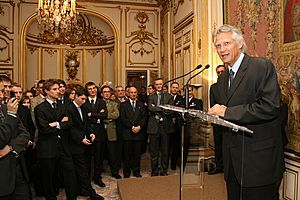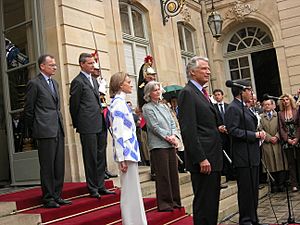Dominique de Villepin facts for kids
Quick facts for kids
Dominique de Villepin
|
|
|---|---|
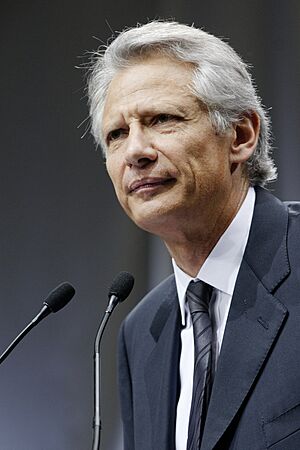
Villepin in 2010
|
|
| Prime Minister of France | |
| In office 31 May 2005 – 17 May 2007 |
|
| President | Jacques Chirac |
| Preceded by | Jean-Pierre Raffarin |
| Succeeded by | François Fillon |
| Minister of the Interior | |
| In office 31 March 2004 – 31 May 2005 |
|
| Prime Minister | Jean-Pierre Raffarin |
| Preceded by | Nicolas Sarkozy |
| Succeeded by | Nicolas Sarkozy |
| Minister of Foreign Affairs | |
| In office 7 May 2002 – 31 March 2004 |
|
| Prime Minister | Jean-Pierre Raffarin |
| Preceded by | Hubert Védrine |
| Succeeded by | Michel Barnier |
| Secretary General to the President | |
| In office 17 May 1995 – 6 May 2002 |
|
| President | Jacques Chirac |
| Preceded by | Hubert Védrine |
| Succeeded by | Philippe Bas |
| Personal details | |
| Born |
Dominique Marie François René Galouzeau de Villepin
14 November 1953 Rabat, French Morocco |
| Political party | Humanist France (2025–present) |
| Other political affiliations |
Rally for the Republic (1977–2002) Union for a Popular Movement (2002–2010) Solidary Republic (2010–2012) |
| Spouse |
Marie-Laure Le Guay
(m. 1985; div. 2011) |
| Children | 3 (including Marie) |
| Relatives | Xavier de Villepin (father) Philippe Le Guay (brother-in-law) |
| Alma mater | Sciences Po École nationale d'administration Panthéon-Assas University Paris Nanterre University |
Dominique de Villepin (born 14 November 1953) is a French politician. He served as the Prime Minister of France from May 2005 to May 2007. He worked under President Jacques Chirac.
Before becoming Prime Minister, Mr. de Villepin was the Minister of Foreign Affairs and the Minister of the Interior. He became well-known around the world when he spoke against the 2003 invasion of Iraq at the United Nations.
After his time as Prime Minister, Mr. de Villepin was involved in a legal case. He was accused of being part of a plan to make false accusations against another politician, Nicolas Sarkozy. However, he was later found innocent of these charges. Mr. de Villepin has also written many books, including poetry and historical essays.
Contents
Early Life and Education
Dominique de Villepin was born in Rabat, Morocco. He spent some of his childhood in Venezuela and the United States. He has mentioned that he "grew up in the United States." During his teenage years, he was inspired by American poets like Jack Kerouac. He finished high school at the Lycée Français de New York in 1971.
Mr. de Villepin has three children: Marie (born 1986), Arthur, and Victoire (born 1989). His father, Xavier de Villepin, was a diplomat and a member of the French Senate. Dominique de Villepin speaks French, English, and Spanish.
He studied at the Paris Institute of Political Studies (Sciences Po) and the École nationale d'administration (ENA). ENA is a very selective school in France that trains top government officials. He also has degrees in law and French literature. After his studies, he served in the military as a naval officer.
Political Career
Diplomatic Roles
After his military service, Mr. de Villepin began a career in diplomacy. He worked in the French government's advising committee on African affairs. He also served in French embassies in Washington, D.C. and New Delhi. Later, he became the Foreign Ministry's top adviser on Africa.
Early Government Positions
In the early 1980s, Dominique de Villepin became an adviser to Jacques Chirac on foreign policy. In 1993, he became the chief of staff for Alain Juppé, who was the Foreign Minister at the time.
Mr. de Villepin then managed Chirac's successful presidential campaign in 1995. After Chirac became President, Mr. de Villepin was given the important job of Secretary-General of the Élysée Palace. This is the official residence of the President of France.
Minister of Foreign Affairs
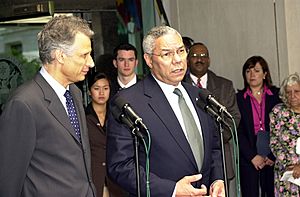
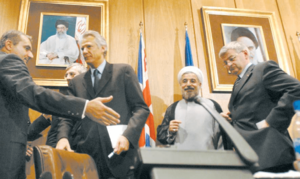
In 2002, President Chirac appointed Mr. de Villepin as the Minister of Foreign Affairs. This was part of Prime Minister Jean-Pierre Raffarin's government.
One of his most famous moments as Foreign Minister was his strong opposition to the United States' plan to invade Iraq in 2003. He gave a powerful speech at the United Nations to explain France's position. This speech was widely praised.
Minister of the Interior
In March 2004, Mr. de Villepin became the Minister of the Interior. In this role, he worked on policies related to public safety and national security. He also focused on integrating different communities in France.
He introduced mandatory courses for Muslim religious leaders. These courses included learning French and understanding French principles like laïcité (secularism). He also took action against some radical religious leaders.
Prime Minister of France
On 31 May 2005, President Chirac appointed Dominique de Villepin as the Prime Minister of France. This happened after French voters rejected a proposed European Constitution in a referendum.
As Prime Minister, Mr. de Villepin's main goal was to reduce unemployment in France. He wanted to make it easier for businesses to hire people. He introduced new types of work contracts, especially for young people and small businesses.
One of these new contracts was called the Contrat première embauche (CPE), or "First Employment Contract." This contract allowed employers to fire young workers (under 26) within their first two years without a specific reason. The idea was to encourage companies to hire more young people. However, this law led to large protests and strikes across France in 2006. Many students and unions felt it was unfair to young people. Eventually, the government had to withdraw the CPE law.
Cabinet Members
Mr. de Villepin's government included several important ministers:
- Dominique de Villepin – Prime Minister
- Nicolas Sarkozy – Minister of the Interior
- Michèle Alliot-Marie – Minister of Defence
- Philippe Douste-Blazy – Minister of Foreign Affairs
- Jean-Louis Borloo – Minister of Employment, Social Cohesion and Housing
- Thierry Breton – Minister of the Economy, Finance and Industry
- Gilles de Robien – Minister of National Education
- Pascal Clément – Minister of Justice
- Dominique Perben – Minister of Transportation, Equipment, Tourism and the Sea
- Xavier Bertrand – Minister of Health and Solidarity
- Dominique Bussereau – Minister of Agriculture and Fishing
- Christian Jacob – Minister of Civil Service
- Renaud Donnedieu de Vabres – Minister of Culture and Communication
- Nelly Olin – Minister of Ecology and Sustainable Development
- François Baroin – Minister of Overseas France
- Renaud Dutreil – Minister of Small Businesses, Commerce, Craftsmanship and Self-Employed Professionals
- Jean-François Lamour – Minister of Youth, Sports, and Associative Life
Resignation
On 15 May 2007, Dominique de Villepin resigned as Prime Minister. His resignation was accepted by President Chirac. He was replaced by François Fillon two days later.
After Being Prime Minister
Legal Case
After leaving office, Mr. de Villepin was involved in the "Clearstream affair." This was a legal case where he was accused of being part of a plan to make false accusations against Nicolas Sarkozy. In 2010, he was found innocent of all charges. The appeals court confirmed his innocence in September 2011.
Other Activities
Since 2008, Mr. de Villepin has worked as a lawyer. He has traveled for business to many countries, including Iran and Argentina. He also advises important organizations and companies.
In 2010, he started a new political party called République Solidaire. He hoped to run for president in the 2012 elections, but he did not get enough support to become a candidate.
In the 2017 French presidential election, Mr. de Villepin supported Emmanuel Macron. In 2020, he opened an art gallery in Hong Kong with his son, Arthur. The gallery features works by famous artists.
In June 2025, Dominique de Villepin launched a new political party called Humanist France.
Personal Life
Mr. de Villepin enjoys traveling in the United States. He has spoken about how places like U.S. Route 66 represent "dreams and opportunities." He believes the U.S. is a source of inspiration for those who love freedom and democracy.
He lives in an apartment in Paris. He collects art, including works by artists like Anselm Kiefer and Zao Wou-Ki.
Famous Quotes
- "The option of war might seem at first to be the swiftest. But let us not forget that having won the war, one has to build peace." (From his speech about Iraq at the United Nations Security Council on 14 February 2003).
- "With the collapse of Saddam Hussein's regime, a dark era is drawing to a close. And we welcome it... Together we must now build peace in Iraq and for France this has to mean the United Nations having a central role. Together we must build peace throughout the region and this can be done only through the determined search for a settlement of the Israeli-Palestinian conflict."
Awards and Honors
French Honors
 Commander of the Legion of Honour (2023)
Commander of the Legion of Honour (2023) Grand Cross in the National Order of Merit (2005)
Grand Cross in the National Order of Merit (2005)
International Honors
 Grand Officer of the Order of Merit of the Italian Republic (Italy)
Grand Officer of the Order of Merit of the Italian Republic (Italy) Commander Grand Cross with Chain Order of the Three Stars (Latvia)
Commander Grand Cross with Chain Order of the Three Stars (Latvia) Commander's Grand Cross of the Order of the Lithuanian Grand Duke Gediminas (Lithuania)
Commander's Grand Cross of the Order of the Lithuanian Grand Duke Gediminas (Lithuania) Grand Commander of the Order for Merits to Lithuania (Lithuania)
Grand Commander of the Order for Merits to Lithuania (Lithuania) Grand Officer of the Order of Saint-Charles (Monaco)
Grand Officer of the Order of Saint-Charles (Monaco) Grand Cross of the Royal Norwegian Order of Merit (Norway)
Grand Cross of the Royal Norwegian Order of Merit (Norway) Grand Cross with Star of the Order of Merit of the Republic of Poland (Poland)
Grand Cross with Star of the Order of Merit of the Republic of Poland (Poland) Grand Cross of the Order of Prince Henry (Portugal)
Grand Cross of the Order of Prince Henry (Portugal) Grand Officer of the Order of the Star of Romania (Romania)
Grand Officer of the Order of the Star of Romania (Romania) Medal of the Oriental Republic of Uruguay (Uruguay).
Medal of the Oriental Republic of Uruguay (Uruguay).
See also
 In Spanish: Dominique de Villepin para niños
In Spanish: Dominique de Villepin para niños
- List of foreign ministers of France
- List of interior ministers of France
- List of prime ministers of France
- Politics of France
- The comic book Quai d'Orsay and the 2013 film Quai d'Orsay were inspired by his time as Foreign Minister.
 | Georgia Louise Harris Brown |
 | Julian Abele |
 | Norma Merrick Sklarek |
 | William Sidney Pittman |


